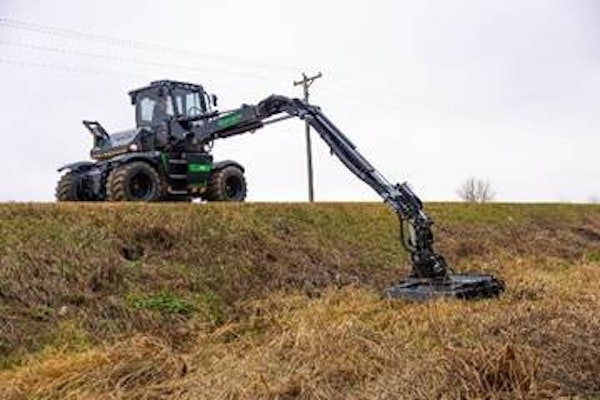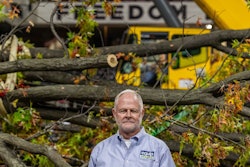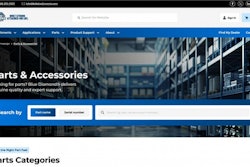If you’re like many landscapers, you probably look to cut costs by buying used trucks and running them into the ground. No question you’re saving money compared with the initial acquisition costs and depreciation associated with buying a brand-new heavy-duty truck. But you may be taking a hit on maintenance and the downtime it brings running older truck models in your fleet.
If you want a new vocational cabover or conventional truck for your landscaping fleet, some intriguing options are on the horizon. Truck leases have long been a standard financial arrangement for long-haul, regional and urban delivery trucking companies – businesses that are admittedly in the trucking business and have powerful financial incentives driving them to manage truck fleet costs. Now truck manufacturers are recognizing that construction and landscaping contractors are a vast uptapped pool of leasing revenue. Several major OEMs including Paccar, Freightliner, Volvo and GMC are offering long-term vocational truck leasing programs that squarely target landscaping companies.
“Manufacturers are willing to talk specific applications with landscapers and take care to ensure they can get the right truck for their needs,” says Geoff Robinson, director of sales, marketing and remarketing for DaimlerChrysler Financial Services. “This arrangement is a good one for landscapers as it lets you manage your business and we manage your trucks – including sourcing, downtime, financing and service.”
Full-service truck leases are 100-percent tax deductible
Truck leases are all about reducing the headaches associated with ownership, says Olen Hunter, director of sales for Paccar Leasing, which leases Kenworth and Peterbilt trucks through more than 270 dealers in North America. “In terms of statistics we’ve seen a 137-percent growth in our vocational lease product line in the past couple of years,” Hunter notes, “and I think several factors are driving that jump: First is the ability of Peterbilt and Kenworth to work well in vocational applications. Also, the average landscaper doesn’t put a lot of miles on his trucks. The vehicles are usually back home every night.”
According to Hunter, a full-service truck lease means you pay for the use of the truck, as opposed to paying for the truck itself. “That normally means big savings – up to 25 percent in a monthly lease payment compared with a truck that you finance to own.”
In a lease, Hunter explains, the cost of the truck, apportioned tax and license, finance charges (a set interest rate for the lease term) and calculated cost-per-mile maintenance expenses minus the calculated residual value determine your monthly payment. “That may seem like a lot of charges,” he notes, “but in reality, it’s not. Keep in mind you’re dividing those costs over the life of the lease term – normally five to seven years.”
It’s that lower monthly payment that has many landscapers taking notice of vocational truck leases. Lowering monthly payments can immediately free working capital while keeping your business’ line of bank credit open for ongoing operations. “Leasing preserves capital that can be utilized for growth, expansion or purchasing additional inventory – all of which typically provide a higher return on investment when compared to purchasing rolling stock,” Hunter points out. “This can be critical for companies in growth or expansion modes.”
Even better, full-service truck leases are 100-percent tax deductible and the lease works as off-balance sheet financing to improve your key financial ratios. If you opt to purchase trucks, the IRS limits depreciation on equipment based on its assigned property class.
Tractors, for example are considered a three-year property class, while straight trucks are classified in the five-year property group.
The Modified Accelerated Cost Recovery System (MACRS) established by the IRS governs how much per year and over how many years an asset is depreciated. An operating lease can provide substantial tax advantages because the lease is 100-percent tax deductible over the life of the lease.
“You have to understand what your business plan is and how you expect a truck lease to contribute to it,” says Terence Dubowick, director of leasing for Mack Leasing System and Volvo Truck Leasing System. “But for the most part, truck leases are beneficial, particularly if you don’t want to take the depreciation credit on your trucks. And outwardly, you’re getting a newer-looking truck for your business. People on the street don’t know whether you own or lease that truck. It’s still going to have your company’s name on it. The driving reason for leasing is financial – it’s a tax-based decision.”
According to Robinson, a truck lease, when implemented and carried out properly, makes things easier for a business as a whole. “A truck lease allows you to outsource a large number of truck-related tasks that can interfere with your core competencies,” he explains. “Organizing and scheduling maintenance become the truck dealer’s responsibility. That dealership becomes a single-source, cradle-to-grave caretaker for your trucks, offering significant cost-savings in the process.”





